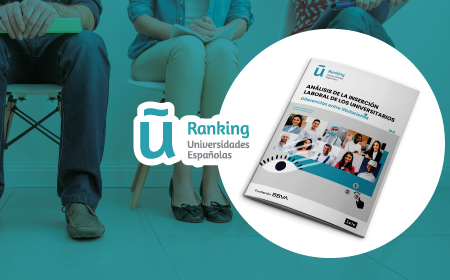Esta web utiliza cookies para que podamos ofrecerte la mejor experiencia de usuario posible. La información de las cookies se almacena en tu navegador y realiza funciones tales como reconocerte cuando vuelves a nuestra web o ayudar a nuestro equipo a comprender qué secciones de la web encuentras más interesantes y útiles.
News

U-Ranking develops a tool to compare labor market results of graduates of different studies and universities
Studies related to Computer Science, Engineering and Health offer the best labor market results
U-Ranking has just added a new tool to its website that allows to compare the labor market results of graduates by studies and universities. This new ranking with information on employability is now included in the Choose a University tool, which helps students choose the most suitable degree and university based on their preferences and priorities.
According to the results, degrees related to Computer Science, Engineering, and Health have, on average, higher employment rates, higher percentage of workers earning a monthly salary equal to or greater than €1,500, higher-qualified occupations and more people working in fields related to the degrees they studied. The best results are achieved by universities with more favorable specializations and locations, such as, polytechnics and several private universities located in the area of Madrid. On the other hand, public universities that offer a wider range of degrees in all academic specialties and those located in areas with less dynamic labor markets have more modest results.
One of the main goals of U-Ranking, a non-profit initiative created jointly by the BBVA Foundation and the Ivie, is to help students decide what and where to study. The wide range of degrees offered by universities (over 4,000 degrees and expanding), the limitations imposed by cut-off marks and the cost of tuition fees, make it challenging for students to choose. There are many factors that students must consider before deciding what or where to study, but job placement opportunities is the one they give greater importance to because it affects their professional future.
For this reason, U-Ranking has now included the possibility to interactively consult a ranking of the labor insertion of 101 areas of studies in which more than 4,000 degrees are grouped. The ranking, which examines the employment situation in 2019 of university graduates from the 2013-2014 academic year, is created using data from the Survey on the Labor Insertion of University Graduates from the Spanish Statistical Office (INE). It considers their employment rate five years after graduating, whether their monthly income is greater than or equal to €1,500, if they have a job that requires a university degree and if it is related to the degree they completed. In addition to the ranking that combines the four indicators, a separate ranking based on each indicator can be generated, in case a specific one is particularly important to the student.
Another new feature offered by U-Ranking is data on labor market outcomes by studies and universities, that enables students and guidance counselors to determine which Spanish universities achieve the best employability results for a given area of study.
To obtain these results, it combines data from INE with that of the Spanish Social Security System. Considering this information can encourage student mobility, since job opportunities depend not only on the degree a student chooses, but also the location where they search for employment. The website also includes a report that explains the main results and conclusions on labor market results of graduates. According to the authors, studies related to the area of Computer Science offer the best results in the labor market: 96.3% employment rate, aproximately 80% of workers earning more or at least €1,500, 92.8% of graduates working in highly qualified occupations and 89% in jobs related to their studies. This is followed by Engineering, Industry and Construction and, in third place, Health and Social services. To arrive at these results, the situation of university graduates in 2019, about 5 years after graduation, has been closely studied.
The report concludes that the main factors that determine employment and its quality are, fundamentally, the student’s choice of degree and their place of residence or employment. Choosing a degree with high employability can increase the likelihood of finding work by up to 25 percentage points. It can also increase by 82 points the probability of having a net monthly salary of more than €1,500, by 81 points the probability of having a job in line with the level of studies and nearly twice (91.8 points) the probability of having a job related to the studies completed.


